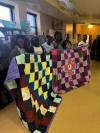Peacebuilding key to successful development efforts
Advertisement
Read this article for free:
or
Already have an account? Log in here »
To continue reading, please subscribe:
Monthly Digital Subscription
$1 per week for 24 weeks*
- Enjoy unlimited reading on winnipegfreepress.com
- Read the E-Edition, our digital replica newspaper
- Access News Break, our award-winning app
- Play interactive puzzles
*Billed as $4.00 plus GST every four weeks. After 24 weeks, price increases to the regular rate of $19.00 plus GST every four weeks. Offer available to new and qualified returning subscribers only. Cancel any time.
Monthly Digital Subscription
$4.75/week*
- Enjoy unlimited reading on winnipegfreepress.com
- Read the E-Edition, our digital replica newspaper
- Access News Break, our award-winning app
- Play interactive puzzles
*Billed as $19 plus GST every four weeks. Cancel any time.
To continue reading, please subscribe:
Add Winnipeg Free Press access to your Brandon Sun subscription for only
$1 for the first 4 weeks*
*$1 will be added to your next bill. After your 4 weeks access is complete your rate will increase by $0.00 a X percent off the regular rate.
Read unlimited articles for free today:
or
Already have an account? Log in here »
Hey there, time traveller!
This article was published 07/02/2023 (971 days ago), so information in it may no longer be current.
The world still has a distance to go in overcoming global poverty. It will take creativity and innovation by leaders in all sectors — a group effort by compassionate people everywhere, including Manitoba. It’s a daunting challenge.
Most of us can agree that everyone should have access to clean water, nutritious meals and quality health care. But international development programs on their own are not enough to achieve these goals. We need peace.
Peacebuilding is the vital ingredient to ensure development efforts are lasting and sustainable. Some may argue that a peacebuilding approach is idealistic. Or impractical. Or simply naïve.
But peacebuilding works.
Adopting a peace lens on international development acknowledges that extreme poverty is complicated. Families don’t fall into poverty overnight. Some have been forced to flee their homes, losing their livelihoods. Some are in conflict with neighbours over limited sources of water because of unpredictable rains or drought. Other families live in the middle of ongoing political upheaval, making everyday activities almost impossible.
Without peace, development efforts fall short.
In my work with Mennonite Central Committee (MCC) over the past eight years, I’ve seen peacebuilding in action.
In Zimbabwe, for example, peace is the ingredient that makes “stinky sticky” farming effective. Local farmers would watch helplessly as their crops withered, attacked by pests.
The solution? Plant a foul-smelling grass between the plants to drive away the moths. The new problem? The pests would gleefully jump to neighbouring fields, devouring other crops. Nearby farmers were enraged. The agricultural challenge had been addressed. But there was no peace.
A better approach? Apply a peace lens to the project. Local partners devised an innovative solution: plant sticky Napier grass around the edge of the plots to trap the pests. The moths would no longer be able to invade the neighbours’ fields. The result was green, lush crops — and a community at peace.
Peacebuilding also requires a robust toolkit of practices to resolve conflicts or prevent conflict from breaking out in the first place. These include conflict resolution skills, restorative justice practices, mediation, dialogue spaces and people-to-people connections.
Humans can thrive only when we live at peace with our neighbours — especially with those who see the world from a different perspective. Instead of seeing difference as a space for fear, peace happens when difference becomes a space for possibility.
In Lebanon, MCC partners run peacebuilding programs for young people. Groups come together across religious lines, building mutual understanding and respect. In a region plagued by religious violence, it is no small feat when people from different faiths or cultural backgrounds begin to talk, build empathy and get creative.
One activity involved designing and installing a colourful mural together. The participants created a piece of art — and began to see the world in a new way. “I was able to let go of prejudice and fear of people who have different religious beliefs than I do,” explained one participant.
Like a teaspoon of yeast mixed into dough, peacebuilding can grow and expand our communities into something yet unimagined. It’s the vital ingredient in international development and in creating a better world for all.
Of course, there’s also the macro level, the bigger political picture. Ongoing conflict, violence and war make everyday life nearly impossible — destroying families’ ability to access clean water, safe education or stable jobs, and contributing to forced displacement.
Development efforts that rebuild access to water, education and employment are pointless unless the pre-existing conditions of violence are remedied. Not through military intervention or increased military spending, but through active peacebuilding.
As we mark this year’s International Development Week, let’s stand together, committed to a better, healthier and more peaceful world for all. Peace is more than a wish. It is possible through action, large and small. And it is essential to international development.
Laura Kalmar lives in Winnipeg and is MCC Canada’s director of marketing and communications.
The Free Press is committed to covering faith in Manitoba. If you appreciate that coverage, help us do more! Your contribution of $10, $25 or more will allow us to deepen our reporting about faith in the province. Thanks! BECOME A FAITH JOURNALISM SUPPORTER
The Free Press acknowledges the financial support it receives from members of the city’s faith community, which makes our coverage of religion possible.


